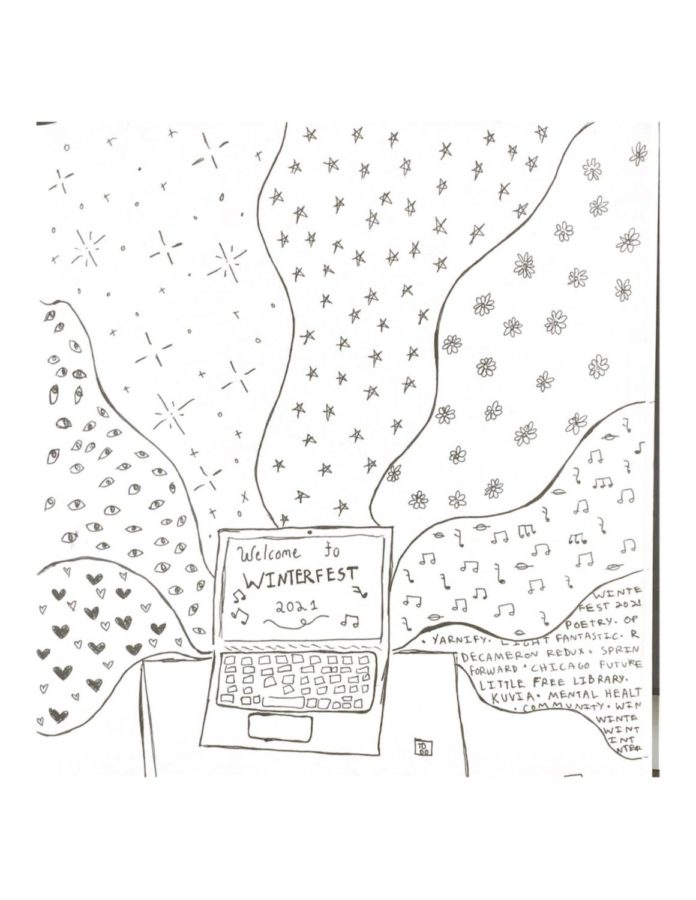UChicago is infamous for its lack of substantive mental health resources, so when I first heard about the College’s Winterfest, I was surprised. This series of interdisciplinary creative events is intended to foster a sense of community throughout winter and spring 2021, and it is the kind of initiative that demonstrates a commitment to support students struggling in quarantine. While the pandemic gave the school a clear reason to create a program like this one, it would be naive to believe that only the pandemic made such a program necessary; at an institution with the intellectual rigor of the University of Chicago, creative outlets have always been essential to students’ mental health. The administration must continue to prioritize better mental health resources when we return to campus every quarter, both by making Winterfest an annual event and by establishing smaller ongoing projects to spark student creativity and connection throughout the year.
After the inauguration on Wednesday, the name I heard most often was not Biden’s. It was not Harris’s. Our attention was captured, not by Lady Gaga, JLo, Garth Brooks, or the outgoing president, but by Amanda Gorman, the inaugural poet. Gorman’s words made sense to us. Reciting her poem, she spoke of our potential, of being better than we are and better than we have been. She spoke of creation. The focus of her poem was national, if not global, but the idea of creation should resonate with us at the individual and community levels, too. In quarantine, many of us have realized how important creative practice is and have begun working with our hands in new ways. Some bake bread, some have learned to embroider or make jewelry, and some have done not-entirely-sober Bob Ross tutorials (absolutely not me and my roommates). Just yesterday, I went to Yarnify! with a friend who has decided to take up knitting. Winterfest is the University’s version of this practice.
With options ranging from “Light Fantastic,” a competition to create collaborative art installations around campus to the “Decameron Redux” writing prompts, to “Spring Forward,” a pageant of student theater and visual art projects, and the lectures of “Chicago Futures,” Winterfest has the potential to appeal, in one way or another, to every student on campus. This makes it different from Scav and other campus-wide events that tend to attract only small pockets of students across campus. The potential to tap into wide-ranging creative power and have a lasting positive impact on student mental health raises an obvious question: Why didn’t resources like this exist at UChicago before the pandemic?
While that’s not a question I can answer, it prompts a pivot: offering resources like this one must be a priority for the University in the future. The Winterfest website states explicitly that this program is intended for “the winter and spring quarters of 2021,” an acknowledgment of the strain the pandemic has put on student creativity and social connection. Though such challenges may have intensified as a result of isolation and virtual schooling, they have always been present in our lives. I, and most UChicago students I know, have experienced feeling community-less and disconnected at some point. Making a tradition of collaborative, art-based events like Winterfest could make a real difference. This suggestion does not in any way cancel out calls, like those linked in this February 2020 Maroon editorial, for improved and expanded access to mental health resources through the counseling center; that is a pressing issue, and it has taken the University far too long to answer students’ pleas. Rather, making Winterfest an annual offering would be an additional way for the University to support its students.
The University must strive to foster connection and mental decompression through the arts in other, smaller ways as well. For example, many of us are familiar with the Little Free Library project—there are quite a few scattered throughout Hyde Park and I, at least, get great joy from the give and take of literature that they allow. The University could set up a version featuring miniature art by students, following the model of Stacy Milrany’s Little Free Art Gallery in Seattle. Each of her galleries is a dollhouse-sized box set on top of a post, and it has a glass door that visitors can open. Milrany created works of art to start it off—tiny paintings, a miniature table—in the hope that others will take one of these artworks and leave one of their own in its place. Constructing these gallery spaces would require only a one-off commitment. Creating the boxes to set up around campus could even be an opportunity to involve UChicago students in collaborative wood-working. Once the physical spaces exist, the galleries would become self-sustaining opportunities for inspiration and creation.
Winterfest is a great resource for a student body facing the unprecedented challenge of winter quarter in isolation. Such resources need not, and should not, disappear when the coronavirus does, though. The University must make a concerted effort to increase their mental health resources, as students have urged them to for so long, and to incorporate art-based collaboration into those resources: Winterfest should be annual, and the University should establish ongoing small-scale creative projects for students to participate in throughout the year. Such projects will not only add to the beauty of our physical campus, but also, more importantly, make deliberate space for the healing creation, discovery, and exchange of beauty that so many of us crave.
Elizabeth Winkler is a third-year in the College.








